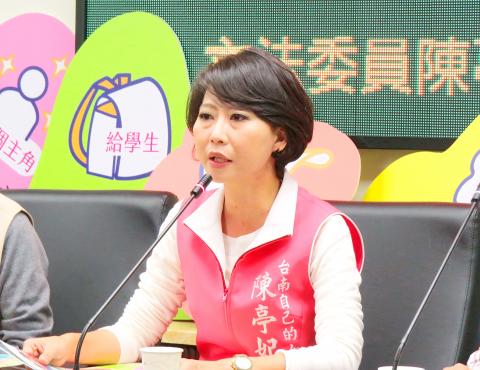Democratic Progressive Party (DPP) lawmakers yesterday proposed amendments that would stipulate prison sentences of three to 10 years for people convicted of spreading Chinese Communist Party (CCP) propaganda that is deemed to endanger national security.
The draft amendments to the Act Governing Relations Between the People of the Taiwan Area and the Mainland Area (台灣地區與大陸地區人民關係條例) was sponsored by DPP legislators Chen Ting-fei (陳亭妃), Chuang Jui-hsiung (莊瑞雄) and Su Chen-ching (蘇震清), and cosponsored by 16 other DPP lawmakers.
The bill says that no citizen, legal person, public or private corporation, organization registered in Taiwan or other entity should spread political propaganda from the CCP, the Chinese People’s Liberation Army (PLA) or the People’s Republic of China (PRC) government, or any political institutions or its agents, that would harm national security.

Photo: Tsai Wen-chu, Taipei Times
All such entities are prohibited from making any resolution, statement or joint statement that would negatively affect national security when attending any meetings held by the CCP, PLA or PRC government, it says.
All competent authorities are authorized to summon any person, organization or corporation for questioning should they have a factual basis to suspect them of breaking the law, it says, adding that if necessary, those entities should provide proof to corroborate their statements.
The bill stipulates a jail term of three to 10 years and/or a fine of up to NT$7 million (US$225,501) for contravening the regulations.
If summoned for questioning and the person, organization or corporation fails to attend, remains silent, gives a false statement or refuses to provide proof, they could face cumulative fines of between NT$100,000 and NT$1 million, the bill says.
The DPP lawmakers also proposed draft amendments to the Satellite Broadcasting Act (衛星廣播電視法), the Radio and Television Act (廣播電視法) and the Cable Television Act (有線廣播電視法).
Those amendments say that the government, citizens and affiliated groups of any country that is at war or in a state of armed standoff with Taiwan are barred from conducting business in the broadcasting industry and prohibited from holding the positions of manager, founder, shareholder, president or controller.
Whether a company has been broadcasting misinformation or failing to verify its sources should be a factor when competent authorities review requests to renew permits, the amendments say.

INVESTIGATION: The case is the latest instance of a DPP figure being implicated in an espionage network accused of allegedly leaking information to Chinese intelligence Democratic Progressive Party (DPP) member Ho Jen-chieh (何仁傑) was detained and held incommunicado yesterday on suspicion of spying for China during his tenure as assistant to then-minister of foreign affairs Joseph Wu (吳釗燮). The Taipei District Prosecutors’ Office said Ho was implicated during its investigation into alleged spying activities by former Presidential Office consultant Wu Shang-yu (吳尚雨). Prosecutors said there is reason to believe Ho breached the National Security Act (國家安全法) by leaking classified Ministry of Foreign Affairs information to Chinese intelligence. Following interrogation, prosecutors petitioned the Taipei District Court to detain Ho, citing concerns over potential collusion or tampering of evidence. The

‘FORM OF PROTEST’: The German Institute Taipei said it was ‘shocked’ to see Nazi symbolism used in connection with political aims as it condemned the incident Sung Chien-liang (宋建樑), who led efforts to recall Democratic Progressive Party (DPP) Legislator Lee Kun-cheng (李坤城), was released on bail of NT$80,000 yesterday amid an outcry over a Nazi armband he wore to questioning the night before. Sung arrived at the New Taipei City District Prosecutors’ Office for questioning in a recall petition forgery case on Tuesday night wearing a red armband bearing a swastika, carrying a copy of Adolf Hitler’s Mein Kampf and giving a Nazi salute. Sung left the building at 1:15am without the armband and apparently covering the book with a coat. This is a serious international scandal and Chinese

Seventy percent of middle and elementary schools now conduct English classes entirely in English, the Ministry of Education said, as it encourages schools nationwide to adopt this practice Minister of Education (MOE) Cheng Ying-yao (鄭英耀) is scheduled to present a report on the government’s bilingual education policy to the Legislative Yuan’s Education and Culture Committee today. The report would outline strategies aimed at expanding access to education, reducing regional disparities and improving talent cultivation. Implementation of bilingual education policies has varied across local governments, occasionally drawing public criticism. For example, some schools have required teachers of non-English subjects to pass English proficiency

TRADE: The premier pledged safeguards on ‘Made in Taiwan’ labeling, anti-dumping measures and stricter export controls to strengthen its position in trade talks Products labeled “made in Taiwan” must be genuinely made in Taiwan, Premier Cho Jung-tai (卓榮泰) said yesterday, vowing to enforce strict safeguards against “origin laundering” and initiate anti-dumping investigations to prevent China dumping its products in Taiwan. Cho made the remarks in a discussion session with representatives from industries in Kaohsiung. In response to the US government’s recent announcement of “reciprocal” tariffs on its trading partners, President William Lai (賴清德) and Cho last week began a series of consultations with industry leaders nationwide to gather feedback and address concerns. Taiwanese and US officials held a videoconference on Friday evening to discuss the